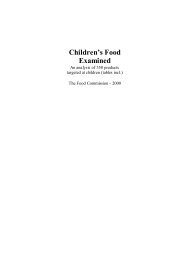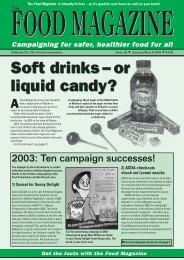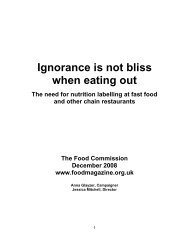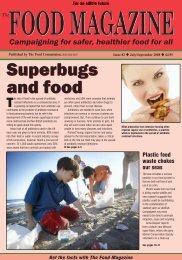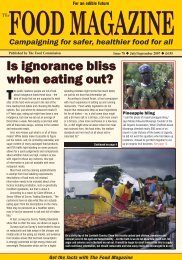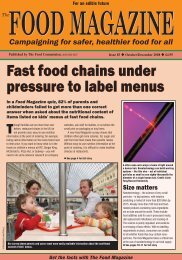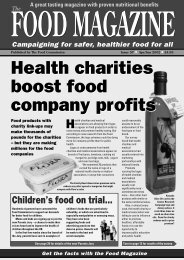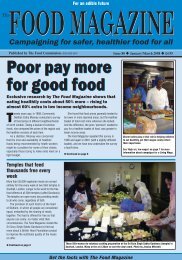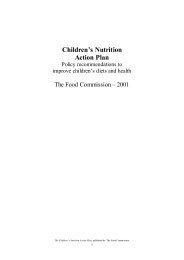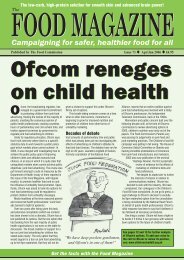Food Magazine - The Food Commission
Food Magazine - The Food Commission
Food Magazine - The Food Commission
Create successful ePaper yourself
Turn your PDF publications into a flip-book with our unique Google optimized e-Paper software.
news<br />
California takes Burger King to<br />
court over acrylamide<br />
<strong>The</strong> state of California is to prosecute nine<br />
major food companies – including Burger<br />
King, KFC, Frito-Lay (Pepsico), Heinz, Kettles,<br />
Pringles and McDonald's – for failing to warn<br />
consumers about the presence of acrylamide<br />
in their products.<br />
Acrylamide is created when starchy foods<br />
are baked, roasted or fried, and has been<br />
identified as a carcinogen for over a decade.<br />
California's anti-toxic law, Proposition 65,<br />
requires producers to warn consumers about<br />
products containing chemicals known to<br />
cause cancer or birth defects.<br />
According to pressure group ELF (the<br />
Environmental Law Foundation), dozens of<br />
products such as fried potatoes and crisps<br />
contain excessive levels of acrylamide. For<br />
every product the group tested, a one-ounce<br />
serving eaten on a daily basis would exceed<br />
levels that require a cancer warning label.<br />
California's Attorney General, Bill Lockyer,<br />
agreed that Proposition 65 requires<br />
consumers to be warned. '<strong>The</strong> law benefits us<br />
all, and as Attorney general, I have a duty to<br />
enforce it.'<br />
His move will be welcomed by<br />
campaigners who have actions already<br />
pending. A private case filed in 2002 by the<br />
Committee for Education and Research on<br />
Toxins named McDonald's and Burger King as<br />
defendants, and is pending in the Los Angeles<br />
County Superior Court. Several further private<br />
suits were filed in August this year by ELF and<br />
by Environmental World Watch identifying<br />
many of the same defendants as the Attorney<br />
General.<br />
<strong>The</strong> agency responsible for administering<br />
Proposition 65, the Office of Environmental<br />
Health Hazard assessment (OEHHA) has<br />
accepted that action is required, but intends to<br />
put labelling proposals out for consultation<br />
and review before issuing regulations. It is<br />
currently consulting on a proposal to raise the<br />
threshold for the amount of acrylamide that<br />
would trigger label warnings by 500 per cent,<br />
from the current 0.2 micrograms (ug) per day<br />
to 1.0 ug/day.<br />
<strong>The</strong> OEHHA justifies the new threshold by<br />
claiming that the cancer is triggered at levels<br />
of acrylamide around 700 ug/kg<br />
bodyweight/day although their data tables 1<br />
suggest that for some cancer sites the trigger<br />
point is as low as 70 ug/kg bodyweight/day<br />
(for tumours of the nervous system), implying<br />
that label warning threshold could arguably be<br />
lowered rather than raised.<br />
A <strong>Food</strong> Standards Agency survey of UK<br />
dietary intake 2 concluded that levels of<br />
acrylamide in our diets were typically less<br />
than 1ug/kg bodyweight/day, although<br />
toddlers eating rusks and biscuits may be<br />
nearer 2 ug/kg/day. <strong>The</strong>re are no plans to put<br />
warnings on UK foods.<br />
1) www.oehha.ca.gov/prop65/law/pdf_zip/<br />
Acrylamide_NSRL.pdf<br />
2) <strong>Food</strong> Survey Information Sheet 71/05,<br />
<strong>Food</strong> Standards Agency, 11 January<br />
2005<br />
M&S puffs up its oily milk<br />
Marks & Spencer (M&S) does a lot of work to<br />
differentiate its products from those of other<br />
supermarkets – mainly to associate health<br />
qualities with their foods. <strong>The</strong>ir sunflower 'Eat<br />
Well' symbol now appears on a very wide range<br />
of healthy salads, fruit, vegetables and prepared<br />
foods. <strong>The</strong> sunflower promotes healthy options.<br />
It also appears on this new omega-3<br />
enriched own-brand M&S milk: 'a healthy<br />
alternative'. <strong>The</strong> label is circumspect and says,<br />
with due regard to the complexity of the<br />
science, that omega-3 fats 'play an important<br />
role in maintaining the health of the heart and<br />
circulatory system' and are 'a major constituent<br />
of the brain and nervous system'.<br />
Not so cautious their PR agency. In true<br />
puffery marketing style, we received a press<br />
release linking omega-3s (and by implication the<br />
omega-3 'super milk') to the 'highly effective'<br />
treatment of ADHD, ME, depression and<br />
dementia 'as well as playing a role in the<br />
prevention of cardiovascular disease and proper<br />
brain and nerve development'. It goes on to<br />
recommend the milk for vegetarians who are<br />
likely 'to consume more omega-6 fatty acids in<br />
proportion to omega-3 than omnivores.'<br />
<strong>The</strong>y rounded off the press release with the<br />
warning that 'Recent research all but blames this<br />
gross disproportion on the genesis of modern<br />
degenerative diseases including arthritis,<br />
cancer, heart attack and stroke.'<br />
Blimey, poor old vegetarians. Wonder if they<br />
know they're all on the imminent verge of death.<br />
<strong>The</strong>y'd better rush out and buy some premium<br />
priced milk to guarantee their immortality.<br />
Within the hour of receiving the press release,<br />
we emailed the PR agency to remind them that<br />
disease risk reduction claims are illegal. No<br />
reply. We wrote to the Advertising Standards<br />
Authority to say that the claims deserved<br />
censure. 'We don't deal with press releases'<br />
came the response. By then, the claims (or<br />
Kraft lobbies for<br />
faster cheese<br />
<strong>The</strong> US food manufacturer<br />
Kraft <strong>Food</strong>s does not appear<br />
to have heard of the 'Slow<br />
<strong>Food</strong> Movement' that<br />
originated in Italy and<br />
promotes the idea of quality<br />
food, enjoyed at an<br />
appreciative slow pace. If it<br />
had, it might question its<br />
latest legal move – trying to<br />
persuade the US government<br />
to shorten the time required<br />
to create mature parmesan<br />
cheese.<br />
At the end of September,<br />
the US <strong>Food</strong> and Drug<br />
Administration received a<br />
petition from the giant food firm proposing that<br />
the minimum curing time for parmesan, defined<br />
in US food standards, be reduced from 10<br />
months to 6 months. Italian producers are<br />
required to cure parmesan for a minimum of 12<br />
months.<br />
Kraft is also opposing proposals from the<br />
European <strong>Commission</strong> that would give global<br />
legal protection to around 600 food descriptions<br />
already protected within the EU. European rules<br />
say, for example, that parmesan cheese can only<br />
come from Parma; feta cheese from Greece; and<br />
Camembert from France. <strong>The</strong> rules do not apply<br />
outside the EU, so parmesan cheese such as the<br />
contents of Kraft's plastic tubs can currently be<br />
made wherever the company chooses. If the EU<br />
rules become globally enforced Kraft would have<br />
to source its cheese only from Parma in Italy, or<br />
re-name its product ‘hard cheese’.<br />
similar) had been<br />
reproduced in <strong>The</strong><br />
Daily Mail, <strong>The</strong><br />
Guardian and <strong>The</strong><br />
Scotsman (and<br />
quite probably<br />
others), reaching<br />
tens of thousands<br />
of potential<br />
customers for the<br />
miracle milk.<br />
<strong>The</strong> message<br />
comes through loud<br />
and clear: if you<br />
want to make dodgy<br />
claims without<br />
reprisal, make sure<br />
you do it in a press<br />
release, then the<br />
media will do your<br />
marketing for you.



